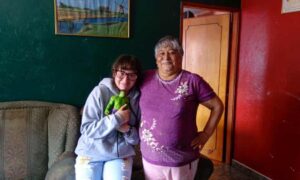
Adela Rubiano Hurtado does not feel there was a point when she made the decision to care for her granddaughter. It was just that when Rubiano’s daughter became pregnant at 15, and could not care for the baby, there was no one else.
“I never considered it a job or a career,” the 67-year-old says from an armchair in her house overlooking the urban sprawl creeping up the mountains of Colombia’s capital, Bogotá. “Who else was going to do it?”
Her granddaughter, Adriana, now 20, has moderate cognitive impairment and has to be cooked and cleaned for, and needs extra support with the work she brings home from the classes she attends at weekends. It is a round-the-clock job, so Rubiano is rarely able to leave the house. At times she feels trapped by her responsibilities.
“I was overwhelmed, frustrated and did not know what path to take,” she says. “There was no one else to talk to about it, either. Sometimes, I just wanted to run away from it all.”
In recent months, however, there is a new palpable sense of optimism in her home. Rubiano is no longer alone. A pioneering project, focused on transforming unpaid care work, has improved her mental health and reframed her love and dedication.
“I can see a different way of doing things now. It’s like the house is in harmony,” Rubiano says.
In Colombia, like most societies, unpaid caregiving falls disproportionately on women. Few choose to dedicate their life to caring for the young, the old or the sick and most carers have no training, financial assistance or recognition. In 2010 Colombia became the first country in the world to introduce a law that requires the contributions of the invisible care economy to be documented.
When Bogotá’s local government studied unpaid care workers in 2018 they found around one in three women in the city – about 1.5 million people – were labouring with little recognition for their dedication, 90% of them living in poverty. Most had no formal education, one in five had a diagnosed illness and 14% were housebound because of the needs of those they care for.
In response, Bogotá’s first female mayor, Claudia López, proposed an innovative programme which then beat 630 other applicants to win the Mayors Challenge prize, securing $1m in funding from Bloomberg Philanthropies in January 2022. One of those coordinating the project is Sandra Milena Blanco.
